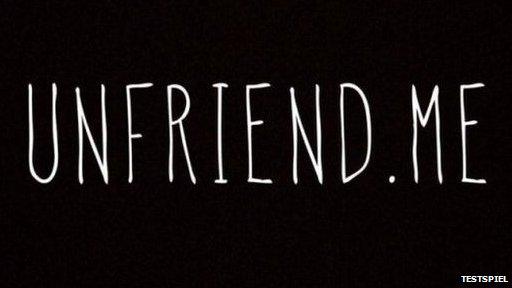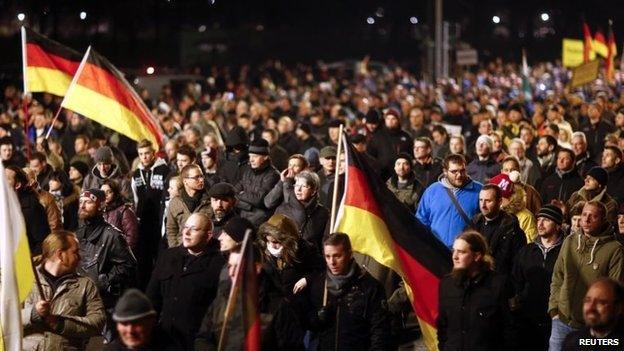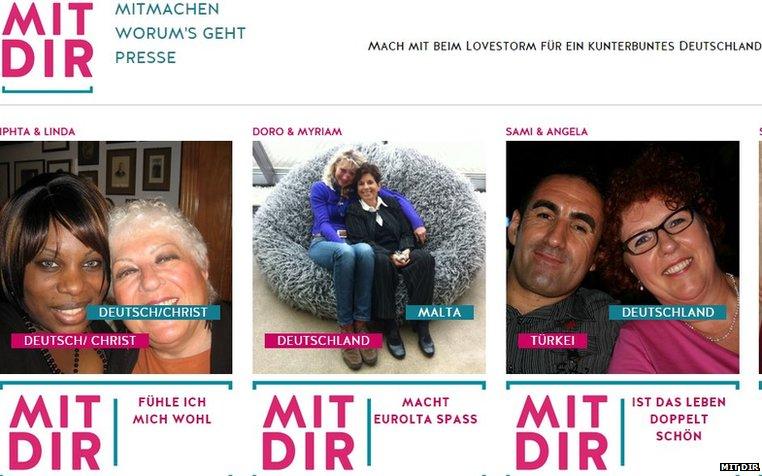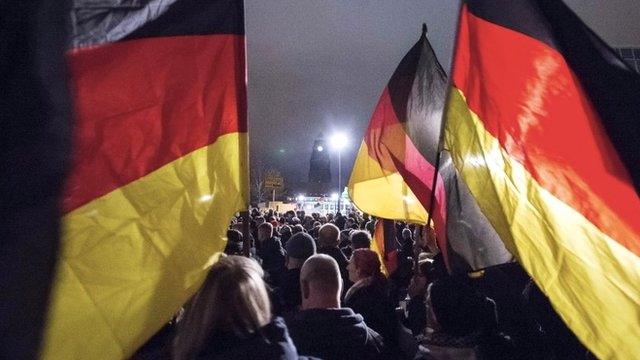Would you unfriend someone for their politics?
- Published

Can you really click away a political movement?
Protests against an anti-immigration movement are spilling from Germany's streets to social media with bloggers calling for people to unfriend Facebook contacts if they "like" the Patriotic Europeans against the Islamisation of the West (Pegida), external movement.
Blogger Marc Ehrich has promoted a tool, external that allows you to check whether someone has liked a Facebook page.
"In April I saw some guys sharing these individual links on their timeline so I thought I would write about it," he said.
"I wanted to provoke a little and start some interesting discussions. At first it was just a list with some music bands that I thought would be funny or amusing for people to find out about, and then I added the anti-euro party AfD and the neo-Nazi NPD party.
"Of course I wouldn't say to someone, 'hey unfriend this guy because he likes [the singer] Helene Fischer, external.' But when it comes to AfD and NPD I wanted people to really think about the likes of their friends."
In December he tweaked the tool to include a Pegida checker because he was annoyed with their supporters.
The blog post immediately went viral. Despite the prominent "unfriend me" title at the top of the page, he says the tool wasn't only meant to be used to drop contacts. But he's unremorseful if that's what people choose to do.
"I heard arguments like, 'Hey, I am following Pegida because I want to be informed.' My answer to that is Facebook 'likes' are a kind of currency. The more likes a site has, the more attention it gets, but you can follow without liking."

Pegida marches in Dresden have attracted thousands of supporters
The discreet nature of unfriending means it's hard to measure how widespread this trend actually is, but the idea does seem to be taking off.
"The unfriending campaign is pretty big here, I think everybody's aware of it," said Berlin-based social media writer Torsten Muller, external.
"I'm not sure it will achieve very much beyond stopping people with different views from talking, but maybe it has raised awareness that there are many people who feel strongly against Pegida."
Munster-based politics teacher Marina Weisband saw the unfriending blog appear several times in her newsfeed and clicked the link. It turned out she only had one Pegida-liking friend.
"He was an old school mate, who joined the police force straight from school I think," she said.
"I didn't try to engage him in conversation because he's not a close friend. If he was I might have tried to talk to him, but he wasn't so ..."
Would you unfriend someone for their politics?
She's fully aware of the downsides of unfriending people with alternative viewpoints, namely narrowing the conversation and removing the chance for them to be influenced by more moderate views. But for her, the personal connection wasn't there to justify angsting over.
"Pegida is a sensitive topic, but I do think it's important for people to see they don't come from the centre and their views aren't widely accepted. They probably think, 'hey, we're just normal people with family and friends' but that's not actually the case, and maybe they will see that if they start to lose connections."
Marina wasn't the only one to respond to the unfriending call.
"I have [deleted friends] in self defence, because I caught myself in very unpleasant discussions with him or his 'friends'," one of her friends Ralph Pache said in response to her unfriending thread, external.
Not everyone is convinced by the strategy though.

One campaign group started a more inclusive social media campaign this week in an effort to demonstrate the multi-cultural nature of German society
Christoph Schott is Germany's head of e-campaigns at Avaaz, external, a global civic organisation that promotes activism. He says the divisive nature of the unfriending campaign worries him.
"I feel like it's not the right way to go about things. Pegida is making a big split in Germany and at hard times like this, with what is happening with Charlie Hebdo in France, we don't want to be divided here, we need to face these threats together.
"We exist both online and offline, so we can protest on the street and on social media. Unfriending is just one social media campaign but there have been online petitions too.
"At Avaaz we've just started Mit Dir, external to show how united and colourful we are."
The idea is for Germans to upload pictures and memes and also post photos of themselves in Germany with someone from another country, race or religion.
"Amid this political storm, we're trying to create a love storm," Schott says.
"The question of how you resolve this split appearing in our society is a big issue for us but we can only solve it together," he adds.
Blog by Sitala Peek
You can follow BBC Trending on Twitter @BBCtrending
All our stories are at bbc.com/trending
- Published5 January 2015

- Published16 December 2014

- Published14 September 2012